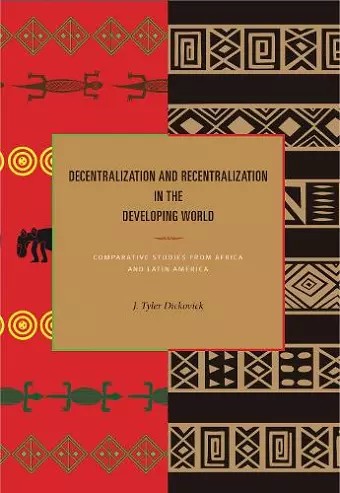Decentralization and Recentralization in the Developing World
Comparative Studies from Africa and Latin America
Format:Hardback
Publisher:Pennsylvania State University Press
Published:21st Mar '11
Currently unavailable, and unfortunately no date known when it will be back
This hardback is available in another edition too:
- Paperback£33.95(9780271037912)

In the 1980s and 1990s, much of the developing world experienced transitions to democracy accompanied by economic liberalization and decentralization of power to subnational governmental bodies. The process of decentralization has been studied intensively, but little attention has been paid so far to the recentralization that has occurred in some countries in the past decade. In this book, J. Tyler Dickovick seeks to illuminate how the processes of decentralization and recentralization are interrelated and what the dynamics of each is. He argues that decentralization occurs as a result of the decline in the power of the presidency, whereas recentralization occurs when the president resolves an extraordinary economic crisis. The processes of decentralization and recentralization, Dickovick further argues, have the same dynamics whether they occur in federal or unitary states. To test the theory, Dickovick compares a strong federal system, Brazil, with a weak one, South Africa, and compares these in turn with two unitary regimes, Peru and Senegal. Decentralization and Recentralization in the Developing World provides a much more nuanced understanding of when and why decentralization and recentralization happen, and what their importance is to intergovernmental shifts in power.
“J. Tyler Dickovick has written a pathbreaking work built on an insightful analytical framework and sustained by excellent fieldwork in several countries. He makes several notable contributions to the field of comparative studies of decentralization and federalism. First, he broadens the way that decentralization is measured in cross-national perspective. Second, he applies the theoretical framework in varied policy settings, such as health care and education, proving that it is broadly applicable. Third, in his analysis, he seriously considers differences in the sequencing of crises and policy responses, thereby adding to an emerging interest in these issues in the decentralization field. And finally, his meticulous empirical work is cross-regional as well as cross-national, making it a valuable resource for future studies in a variety of locations. Decentralization and Recentralization in the Developing World is a good example of the finest scholarship in comparative politics.”
—Alfred P. Montero, Carleton College
“Why does decentralization stick in some countries but not in others? How do presidents try to recentralize authority? Under what conditions do they succeed? In the first major book to appear on the politics of recentralization, J. Tyler Dickovick offers compelling answers to these questions. By insisting that we move beyond decentralization—and by showing how we should apply a common analytical framework to the study of decentralizing and recentralizing changes—Dickovick significantly broadens the scope of the literature on intergovernmental relations. Based on extensive primary research in an unusually disparate set of African and Latin American cases, Decentralization and Recentralization in the Developing World also innovates by focusing on dynamics that had yet to be integrated into the political science literature on decentralization, including what takes place within the bureaucracy, who controls labor markets, and why subnational governments either proliferate or amalgamate in the wake of decentralization. This is a must-read for students of subnational politics.”
—Kent Eaton, University of California, Santa Cruz
“J. Tyler Dickovick has made an important contribution to in-depth studies of decentralization. His detailed focus on Brazil and South Africa—a choice that will stimulate much-needed comparative research among scholars in these countries—during a period of intense institutional development and social change, with additional discussion of Peru and Senegal, will help all who are trying to follow and understand the pendulum swings that take place in national-local relations and in different policy areas. For too long there has been a tendency to view the centralization-decentralization dynamic as one in which the latter is somehow more democratic than the former and in which subnational governments are the cornerstone of democratic development. In this perspective, recentralization would normally carry negative overtones. Dickovick not only points out that things are not as simple as they might seem, but also helps us to recognize the importance of the fiscal arena, with its negotiations and bargains between very different actors at different levels, as the place in which to look for the unfolding history of the present.”
—Peter Spink, Fundação Getúlio Vargas–São Paulo
“Dickovick provides extensive conceptual and theoretical discussion . . . ultimately emphasizing historical institutional dynamics and political economy.”
—K. Staudt Choice
ISBN: 9780271037905
Dimensions: 229mm x 152mm x 24mm
Weight: 481g
248 pages